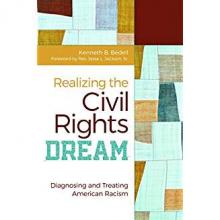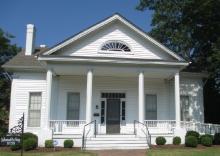NCC Tradition of Anti-Racism

This awakening is led by the National Council of Churches of Christ in the USA (NCC) its 38 member denominations in partnership with National African American Clergy Network, The Conference of National Black Churches, and more than seven additional civil rights and religious organizations. It will kick-off with a rally on the National Mall on April 4, 2018, the 50th anniversary of the assassination of Rev. Dr. Martin Luther King, Jr.
Planned events include:
Tuesday evening, April 3: Service of Worship in the Orthodox Tradition
Wednesday, April 4: Rally on the National Mall, 7:00am to 4:00pm
Thursday, April 5: Day of Action in the Nation’s Capital
The sponsors of this rally promise that “This launch event will be followed by an extensive program that will address racism in the areas of church life and practices, criminal, economic and social justice, civil and human rights, environmental justice, immigration, media, and education.”
Organized in 1950 by pulling together 29 Protestant and Orthodox denomination, the NCC has been a staunch anti-racism voice. Shortly after it’s founding (January 1951) the NCC issued a resolution on “Racial Discrimination in Armed Serves and Employment.” It commended DOD for desegregation. Called for legislation to protect all Americans from discrimination based on race, creed or national origin.
By 1957 the NCC had moved from just issuing statements to direct involvement in anti-racist activity. Will Campbell, the director of the NCC Southern Project, was one of four adults who ushered the Little Rock Nine into Central High. 1957 was also the year that the NCC declared that racial segregation is contrary to the teaching of Jesus.
In the early 1960s the NCC was a coalition of mostly white mainstream Protestant Churches. In 1962 the NCC helped organize a National Conference on Religions and Race that was held in Chicago in January of 1963. The conference called upon “all the American people to work, to pray and to act courageously in the cause of human equality and dignity while there is still time, to eliminate racism permanently and decisively.” Dr. King participated in organizing the meeting and spoke on the closing day.
As the civil rights movement expanded in the early 1960s the NCC supported actions such as sit ins and continued to support civil rights particularly the right to vote.
In the 1980 NCC membership included 32 denominations with a combined membership of over 40 million people. Although Roman Catholics and Southern Baptists have never joined the NCC, representatives from these large denominations have sent "observers" to participate in divisions of the council. During this period the NCC also expanded its reach beyond Christian expressions of faith. In the 1980s the Islamic Society of North America, Unitarian Universalist Association, and several Jewish organizations were granted observer status. Today membership includes seven denominations with predominately African American membership and the Korean Presbyterian Church Abroad. NCC anti-racist activity today comes with multi-racial and interfaith input and support.
Although the current initiatives stand on an honorable tradition of bold anti-racism. There are also lessons to be learned from the past. During the 1950, J. Oscar Lee was the only African American on the staff of the NCC. While making statements about what congress and churches should do, the NCC leadership did not fully address the racism within the organization. As the chief staff of the Department of Racial and Cultural Relations he was in a position to recommend highly qualified African Americans for leadership positions. Whites were always preferred. He believed this was largely because white staff at the NCC did not want to have a Black supervisor.
There were also times when African America church leaders needed to take strong action to gain the attention of white NCC leadership. An example of African-American prodding is the adoption of a strongly worded “Statement on Churches and Segregation.” The plan was to adopt the statement on March 21, 1952. When southern whites objected to the clear language, the statement was tabled “for study” for three month. On March 23, Adam Clayton Powell’s Abyssinian Baptist Church with 2,000 members voted to secede from the NCC. The protest was joined by 75 African Methodist Episcopal Church ministers who adopted a resolution that called on the NCC to reconsider postponing the vote. While the vote was not pushed forward, the result was that the strongly anti-racism document was not watered down to satisfy the white southerners.
The NCC's ACT to End Racism initiative is an opportunity for the organization to return to its early role in civil rights leadership which began to unravel in 1964 and completely came apart in 1969. The race riots in Watts and other cities caused confusion at the NCC. The council was unable to form a consensus to claim Dr. King's legacy of non-violence because of an unwillingness to condemn those had suffered from racist violence when they struck out violently. Dr. King had drawn a straight line between the violence of the Vietnam war and and the violence used to preserve racism, but it wasn't until 1969 that the NCC was able to produce a statement on violence. Today the NCC has an opportunity to reclaim the role of non-violent political action because of its faith-based foundation as well as its practical effectiveness.
1969 ended the chance that NCC had to participate in ending racism. James Forman, a former leader of the Student Nonviolent Coordinating Committee, presented his “Black Manifesto” document in April of 1969 at a conference in Detroit. Among other things the manifesto demanded $500 million in reparations from white church organizations to make up for the crimes and injustices perpetrated by white Christians. The document also called for changes in the economy to address systemic racism. Forman was continuing the legacy of King who organized the Poor Peoples March and recognized the role of the economy in perpetuating racism. While some leaders in the NCC at first embraced the Black Manifesto, it did not become the basis for developing a comprehensive plan to end racism with support of white Christians. The current initiative by the NCC offers the possibility of starting again by picking up the lost opportunities of 1969. By reintroducing non-violence and the need to end the economic monopoly of whites, the council can restart where it left off in 1969.
Since the 1980 the NCC has changed greatly. While denominations have not left the organization, they have greatly reduced their financial support. Afraid of going down with the ship, the financially viable NCC program, Church World Service, left the NCC umbrella in 2000. More recently the NCC shed the activist division as a cost saving measure. Today it is a mere skeleton of what it once was. This means that the council does not need to avoid offending white sensibilities in Christian churches because the NCC is no longer depend on their money. Rather than money, the various faith traditions can bring their wisdom to the table in developing anti-racism strategies. The NCC is free to play a prophetic role by bringing together the wisdom from faith traditions and its legacy from the 1960s.
The rally on April 4th, 2018 is a new beginning for the National Council of Churches. Hopefully it is also a new beginning for the United States of America.
For updates on the planning for the rally register with rally2endracism.org.




 Contact Us
Contact Us